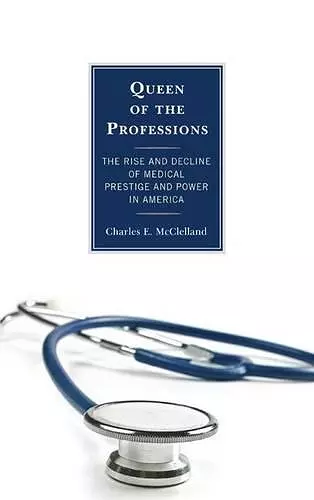Queen of the Professions
The Rise and Decline of Medical Prestige and Power in America
Format:Hardback
Publisher:Rowman & Littlefield
Published:15th Oct '14
Currently unavailable, and unfortunately no date known when it will be back

American medicine is under serious attack. The health care system is falling short of its major goal, improving the health of the population. The United States ranks only 35th in world life expectancy. But where American medicine arguably remains at a pinnacle in the world – in the status, wealth and power of the profession of medicine -- physicians are in danger of losing first rank. As other professions close the gap, their top economic position is threatened. Slippage may be measured also by other, less quantifiable factors, such as the highest prestige of physicians among all learned occupations. Queen of the Professions: The Rise and Decline of Medical Prestige and Power in America is a colorful yet authoritative work of social history offering readers a sturdy platform from which to confront looming issues about the future of American medical care. Its unique perspective brings crucial context to current debates about modern medicine, exploring in entertaining detail its historical foundations and its present and future challenges.
Medicine as a profession has a protracted ancestry with origins located deep in antiquity. Tracing the ancestry of the profession to inform the present is the motivation behind this work. In this context, social historian McClelland provides a broad historical overview of the rise of professional medicine within the context of social theory. He begins the four-part work with a discussion of the origins of the profession from the time of the early Greeks through 1850. In later sections, he focuses on the evolution of medical education, ethics, and the future of the profession. One of the more interesting observations the author makes is that with the rise of so many mid-level medical, nursing, and health professionals, the current environment appears similar to the environment prior to the release of the Flexner Report in the early 20th century. How this came about and the implications for the profession's future are well addressed. Written in an academic style, the book is supported by ten pages of chapter notes and a four-page bibliography. Valuable for all academic audiences and an important resource for professionals in the health field, especially those in medicine. Summing Up: Recommended. Lower-division undergraduates and above. * CHOICE *
It took millennia for the practice of medicine to escape a dangerous swamp of ignorance, superstition and quackery to become a profession. Now, a University of New Mexico historian sees signs that economic and social pressures are in the process of turning that profession into a trade. UNM Prof. Emeritus Charles E. McClelland outlines his argument in a new book, Queen of the Professions. Its subtitle summarizes the book pretty well: The Rise and Decline of Medical Prestige and Power in America. * Albuquerque Journal *
Charles McClelland, an internationally recognized authority on the history of modern professionalization, here offers a highly readable account of the creation of a medical profession in the United States in terms of both scientific and socio-legal history. McClelland also locates the American medical profession in the comparative context of medical professions in Europe. But McClelland’s account is not only that of a “rise” in accordance with conventional ideas of “American exceptionalism,” but also of a decline of the status of American physicians in the wake of the creation of a vast health industry in which they no longer possess autonomy, control, authority, or economic dominance in a greatly transformed marketplace of technologies and services. -- Edward Peters, Professor Emeritus, University of Pennsylvania
McClelland offers a sweeping history of Western Medicine and a social historian's perspective on why medicine's "professionalization project" - the drive to secure monopology, power, and prestige - seems to be failing as social forces undermine doctor's autonomy. This nicely-organized survey will appeal to anyone interested in the paradox that while the future of medicine is bright indeed, the future of the medical profession is uncertain at best. -- Charles S. Bryan, M.D., MACP, Heyward Gibbes Distinguished Professor of Internal Medicine Emeritus, University of South Carolina
ISBN: 9781442226302
Dimensions: 236mm x 162mm x 21mm
Weight: 454g
214 pages